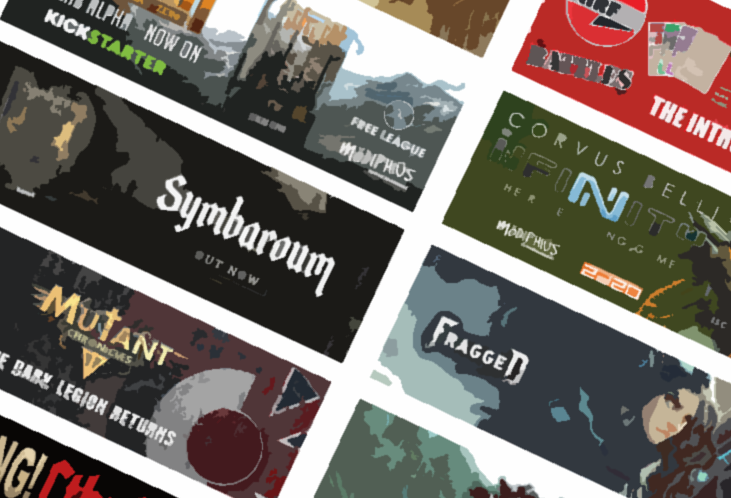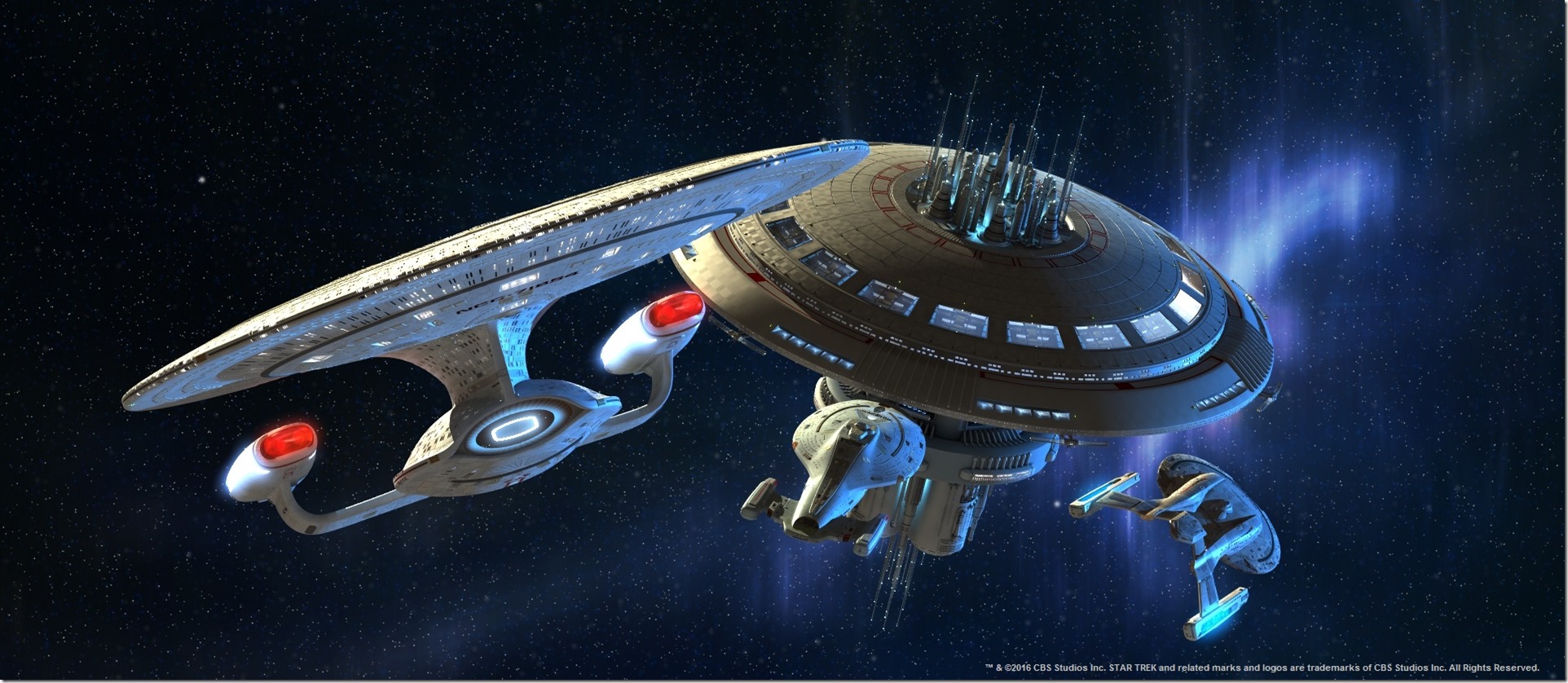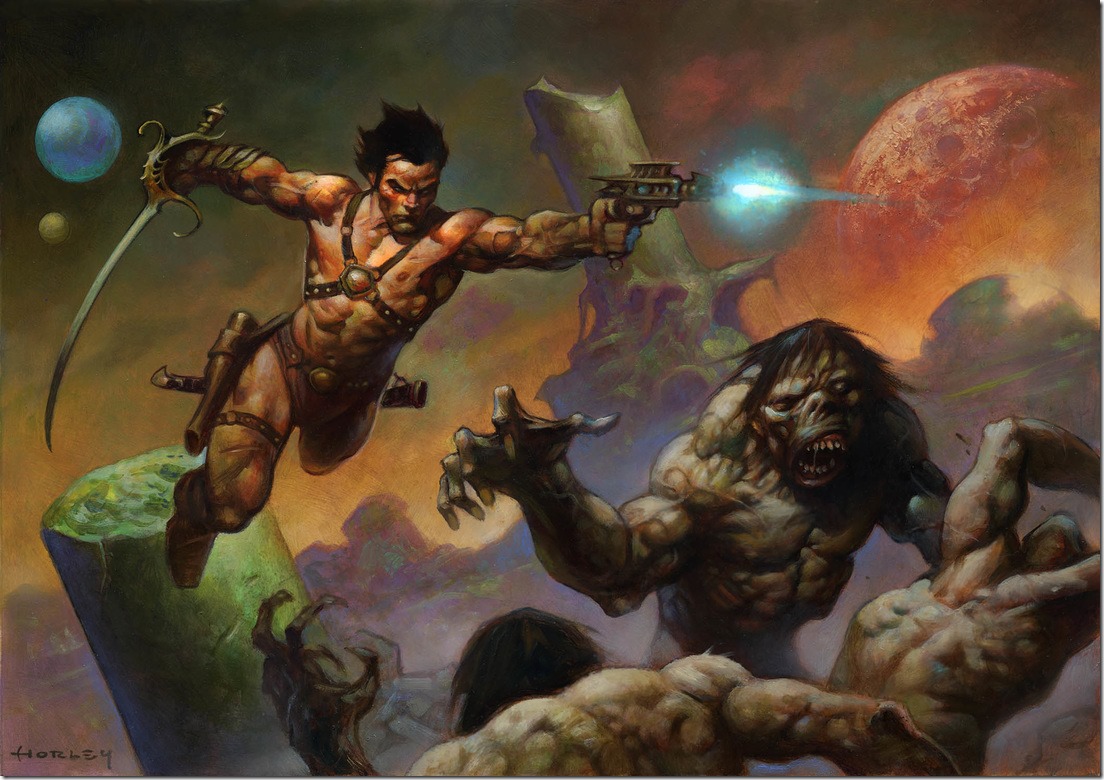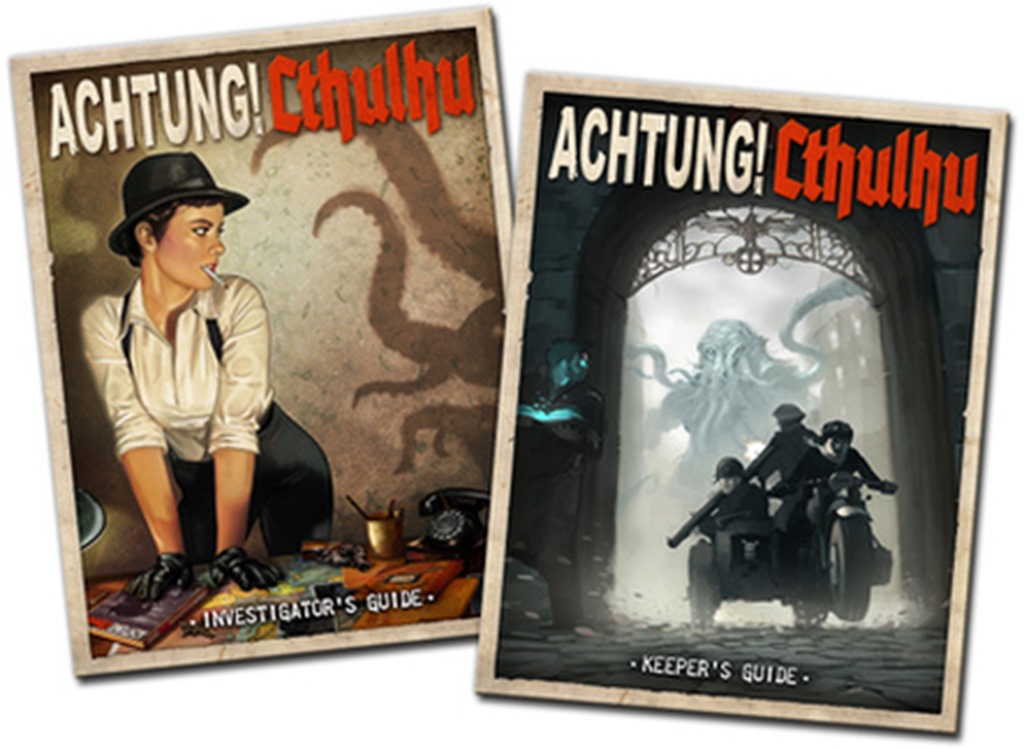Back when the new Conan RPG by Modiphius was released I contacted Chris Birch and asked him if he was interested in doing another interview with us. Here’s what Chris and Sam Webb, the line manager for the upcoming Star Trek game had to say…
Stargazer: Thanks for taking your time to answer our questions. I don’t think introductions are needed because Chris Birch and Modiphius have become household names in the RPG hobby during the last few years (Editor’s note: there’s also our interview with Chris from 2015 if you need a refresher). At the moment the Star Trek Adventures playtest is in full swing. Chris, can you tell us more about the playtest? In what phase of testing are you at the moment? What if someone missed the first few playtest opportunities, is there still a chance to enter?
 Chris: I’m going to introduce Sam Webb our line manager on Star Trek here to answer a couple of the questions, Sam has a background in running RPG clubs, big LARP events in the UK and joined Modiphius last year as my assistant before moving on to direct the development of Star Trek.
Chris: I’m going to introduce Sam Webb our line manager on Star Trek here to answer a couple of the questions, Sam has a background in running RPG clubs, big LARP events in the UK and joined Modiphius last year as my assistant before moving on to direct the development of Star Trek.
 Sam: The playtest is in full swing, as you say. We’ve had the core rules feedback, based on the first adventure we released late last year, while we’ve had feedback about the starship rules from the first full wave of adventures we released. What’s exciting about this playtest is it also introduces our Living Campaign, so as I speak we’re getting feedback on what choices groups made and then that will lead to an Admiral’s Communique about the final, crowd-sourced, actions that each crew took! We’ve just released the character creation rules for playtesters to try out and once feedback is back for that, it completes the playtest proper… but the Living Campaign will continue before and after the game’s release in August! At this stage we’re not taking more playtesters (there’s over 10,000 already!) but do sign up so you can get involved in the living campaign.
Sam: The playtest is in full swing, as you say. We’ve had the core rules feedback, based on the first adventure we released late last year, while we’ve had feedback about the starship rules from the first full wave of adventures we released. What’s exciting about this playtest is it also introduces our Living Campaign, so as I speak we’re getting feedback on what choices groups made and then that will lead to an Admiral’s Communique about the final, crowd-sourced, actions that each crew took! We’ve just released the character creation rules for playtesters to try out and once feedback is back for that, it completes the playtest proper… but the Living Campaign will continue before and after the game’s release in August! At this stage we’re not taking more playtesters (there’s over 10,000 already!) but do sign up so you can get involved in the living campaign.
Stargazer: For every playtest player and GM feedback is essential. How has the feedback been so far and can you tell us about the changes your team has implemented based on the playtest reports you received?
Sam: We were pretty sure going into the project of our in house system, 2D20, so we didn’t really need to cover the basics like “does rolling 2 dice work?” because we knew it did. However the system had some major ‘bodywork’ to tailor it more to the Star Trek universe. Most of the feedback has been based on whether the revised rules are thematic and suit play in the Star Trek Universe and thankfully most of the feedback confirmed our thoughts and the ideas our rules developer Nathan Dowdell put forward in the Alpha Rules. The Attributes and Disciplines worked well, as did the Values. It’s mostly been about balance, so Focuses, for example, went from having a rating to just applying to the Discipline you’re using. So instead of having a fixed range for rolling a critical, that range is now the score of the Discipline you’re using. We moved Extended Tasks from basic rules to an optional rule you can use if you want to add more complexity, as we found that mechanic received mixed reviews and some playtesters found it confusing. So overall, we seem to be on the same page as the fans and that makes us happy.
Stargazer: From what I’ve seen so far your focus is on the late “Next Generation” to “Voyager” era. I am a fan of Star Trek Enterprise myself. How much support will the pre-Federation era get after the Star Trek Adventures’ release? Will there be era-specific material in the core book?
Sam: Absolutely. The core book is set in the year 2371 because it’s an incredibly exciting year. The Dominion and the Founders have just been discovered in the Gamma Quadrant so every major power with a presence in the Alpha Quadrant is trying to figure out what to do from that perceived threat! Then Voyager goes missing and the Enterprise-D is destroyed! But of course there’s still a huge following for the Original Series and the Enterprise era. We’re developing a starter set that’s an old style tricorder, with booklets for characters’ divisions and a GM booklet with rules and adventures in, all geared towards adventuring in the era of Captain Kirk! The core book includes support for Original Series missions so there’s nothing stopping you using the core rulebook to run adventures in those other eras. We do plan more supplements that focus on the pre Next Generation eras of play.
Stargazer: How different is the Star Trek incarnation of 2d20 from your other games? The 2d20 System in Star Trek Adventures feels a bit “lighter” than in the other games. Was this intentional to make the game more accessible to fans of the Star Trek franchise who are not gamers or is this something you want to change during the development?
Chris: We don’t just copy paste each version of 2d20, as Sam mentioned above it goes back in to the body shop and gets a full overhaul so that the new interpretation ‘feels’ like the universe we’re playing in. Phasers have to act like Phasers, roleplaying characters has to feel like the shows and movies not just some gun toting ship crew in red uniforms. As part of this process we deliberately dialled down the complexity of the system somewhat so it flows fast and can be picked up easily, yet has some great depth. We’ve made adjustments as we’ve gone, such as moving the Extended Tasks mechanic (a way of running complex tasks under pressure) into optional rules as we felt it wouldn’t be for everyone.
Stargazer: Let’s now come to the big question: when will Star Trek Adventures be released?
Chris: We’re currently working towards a pre-order online starting end of April with retail pre-orders following soon after. You’ll find it at Gen Con at the Modiphius stand, but also in stores soon after.
Stargazer: If I am not mistaken there are quite a few 2d20-based games in development – aside from Star Trek Adventures – right now. From the top of my head I remember the John Carter RPG and Infinity. Can you tell us a bit about the status of these projects?
Chris: Infinity is just about to go to print after some extended delays, and we hope to see it in retail in the summer, whilst Conan has already gone to print and should hit retail late July. Both have 20 or more books coming in their lines over the next couple of years so there’s going to be a lot of support for both games. John Carter of Mars is a lite version of 2d20 called 2d20 Momentum and is a much more narrative interpretation of the rules, the book is a gorgeous landscape book – part art book, part RPG. There’s a collectors resin miniatures line ‘Swords of Mars’ and boardgame ‘Warlords of Mars’ coming as part of a Kickstarter in July.
Stargazer: The vast majority of Modiphius’ products are license-based. In the past license deals have always been a mixed bag for RPG publishers. While I totally love what you have done so far, I am sometimes worried that Modiphius’ reliance on license deals may become problemetic in the future. Can you share your thoughts on that subject? Do you plan to add more original (as in non-licensed) product lines to the mix in the future?
Chris: We’re constantly developing our own IP Achtung! Cthulhu through a new audio series (pilot launching soon), novels, a new boardgame following on from the Shadows of Normandie boardgame and a sequel ‘Bye Bye Baby’ early in 2018 which takes the story out of the history books and into the realms of what if ‘the nazis woke the sleeping god in the Mountains of Madness’? Achtung! Cthulhu is part of our massive Secret War storyline which reaches back to Atlantis and forwards to a very distant future so you can expect to see a lot more gaming worlds, all connected, coming out next year. Rather than generate lots of different IP we’re trying to create it all around one central storyline.
Aside from that I come from a fashion background where licenses were as important as the in house designs and it’s why you’ve seen us do a lot of license projects – it lets us create fantastic gaming worlds, bring together big new communities and introduce them to other gaming lines. The sales from licensed projects help us be more creative with what we can do with out own IP. With all the other partner projects like Mindjammer, Symbaroum, MUTANT, Coriolis, Tales from the Loop etc this also gives us the ability to reach thousands of gamers and introduce them to lots of new RPG worlds. Of course there’s always a risk with any game line licensed or not, we’re quite careful with licenses, but also only work on those we’re passionate about and get excited to work on so I think this increases our chances of success. We always have a few licensed projects in discussion since the business can’t sit still – we’re looking at projects for 2018, 2019 and 2020 already. Once you have a big team on salaries you have to consider their welfare and ensure you have enough projects to keep them employed so we’re constantly looking at what projects will be the most fun and bring in the most revenue to grow our little family.
Stargazer: With the 2d20 System you have a strong set of mechanics you can adapt to basically every setting and genre. Have you ever considered licensing the system to other publishers or even releasing a generic version which players can use for their homebrew games?
Chris: Yes in fact that’s the plan this year we’re starting what’s called the Momentum Partners programme. There will be a neutral 2d20 scorebook later this year and a license for publishers to produce supplements or full games with us. Partners will be able to simple produce supplements on their own, or submit and publish through us to benefit from our marketing and distribution reach. We’ll be announcing more details on this soon.
Stargazer: Modiphius has done quite a few Kickstarter projects over the last years. How has crowd-funding changed over the years and do you think it’s a boon or a bane for role-playing game and boardgame publishers?
Chris: It’s an amazing benefit, it’s like the bedroom days of house music when suddenly any creative person could create awesome sounding house tunes in their bedroom and make it big. That’s what’s happening with games now, of course it leads to a glut of games but here’s what’s key. There’s lots of kickstarters just selling to a few passionate fans and that’s it. And that’s fine – because that game appealed to those people and they could fund it and be happy. This empowering of the creative process gives us unprecedented variety. Now on the distribution side retailers are seeing something like 80 new products every week – from dice to minis, books and boardgames. They can’t keep up with it all so it’s getting a lot harder for smaller companies to get their games in to retail. This means that retailers are having to do more work to check what’s popular, what’s selling, listening to what their customers want. This has a similar effect of forcing the very best to the top because you’ve not got to get everything right, not just produce a mediocre game. I don’t mean stupidly high production values, but a seriously good game that gets great reviews. Get that and decent production and you have a chance. We’re in a gaming renaissance with more amazing games than you could ever play and that can only be good.
For the producers whether I want to produce a very niche boardgame for a few people across the world and I don’t care if it ever gets in to retail or if I want to produce a massive minis game with all the flashy bits I have an amazing opportunity IF and I mean IF I put the hard work in both before, during and after the Kickstarter. It’s not an easy ride, it can destroy your personal life, it requires very very long hours in the lead up to and during the Kickstarter if you want real success but it’s also one of the most rewarding processes. It’s not changed really since I started, except there’s a lot more people doing much more developed projects now. I still see quite basic looking projects succeed but there’s also a lot more who’ve done more work up front to prepare and this also pays off. For anyone considering I would stress to be as prepared as possible, as many fans up front and as much to show people to increase your chances. If you’re serious nothing is too much.
Stargazer: Is there anything else you want to talk about? What did I forget to ask? Now’s your chance!
Chris: Well we have a MAJOR announcement on the 21st April so keep your ears open if you love miniatures games, plus our Modiphians Community opens soon where people can submit cool ideas for new Monsters, stats, NPC’s, adventures, art, rules variants etc and get the community to vote on it to be made.
Stargazer: One last thing… can you enlighten us on the origins of the name “Modiphiüs”? Why is there an umlaut in it? Is the ü supposed to look like a smiley face or is this just a coincidence? We want to know all the dirty secrets! 😉
Chris: Yes the U is like a smiley face, it’s because I think games should make you smile and as much as our games are filled with action adventure, monsters and villains, at the end of it this all about the awesome and seeing the amazing smile on someone when they discover THAT game that blows them away with all the cool stuff.
So Modiphius started life as the name of a solar system engineered by an ancient alien race in a first RPG myself and my Starblazer Adventures co-writer Stuart Newman wrote back in the 1990’s called Blaster Array. We used to sit up late in to the night dreaming up gaming worlds powered by pizza and diet coke. The solar system in our game was literally ‘modified’ and we took that word and came up with ‘Modiphius’ derived from that. I liked the greek sound to it and we always joked we’d start a games company one day. So when that day came it was the obvious name to use!
We’re just working on a fun animation for the Modiphius logo for our next project which incorporates the squirrels myself and Rita are known for training. When we first started Modiphius we had a female squirrel visit our basement flat every day and she’d have breakfast sitting on my shoulder whilst I tapped our email replies. We now have four descendants in the garden vying for attention and since there’s so many pictures of us with them it felt only natural to build them in to the Modiphius legend!
Stargazer: This concludes our interview with Chris and Sam from Modiphius. I want to thank both of them for taking their time and answering all our questions in so much detail.






Great interview! I’m a big believer in Modiphius’ work and I’m always looking forward to the next big project they have planned.